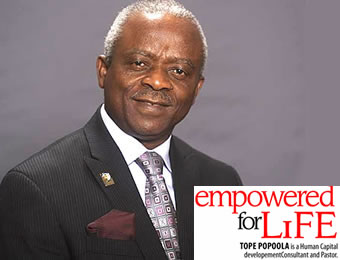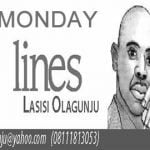Did you ever play street football? One of those games you play where there are hardly any rules and the goal-posts are set at the whims of the players. You know how you kicked the ball around with such zeal and you sweated like a hog while panting and puffing, wondering if a shot you took between the two stones set as goals by the convenience of players was a goal or offside.
Values govern ethical conduct in the life of a leader or organization. A values-driven life is one anchored on solidly set ethical standards that act as the moral compass to the execution of a vision or task. Clearly defined values act as guides to a destination in the same way that rails guide a train to its destination.
A leader or organization without strong values that act as moral code for conduct will adopt the Machiavellian dictum of “the end justifies the means” (and I daresay the meanness!). Throwing values overboard in an organization or personal life is akin to riding a horse without a bridle or playing soccer without goal-posts. In a game without clearly defined rules, every player is a loser.
Two types of values govern personal or corporate conduct. They are core values and peripheral values. Core values are the very foundation of the moral pedestal on which a leader or organization stands to perform work and conduct relationship with others, followers or stakeholders as the case may be. They can be referred to as the minimum ethical standard that a leader desires to hold himself to and the parameters by which he desires to be judged by his public. Very often, one can glimpse the core values of a leader or organization from their mission statement.
On the individual level, core values are supposed to be products of deep introspection that digs deep into the individual’s core convictions and the essence of his being. It begins with an odyssey into the purpose of the individual’s existence, his desired outcomes in life and the strategy he intends to employ. In a corporate environment, the situation is not different. Consequently, core values are not flexible and do not change with fads. Generically contrived core values adopted from a spuriously organized retreat or the recommendations of a consultant can hardly be sustained because values are of no value unless there is a buy-in from all levels of corporate operations. My experience with many corporate organizations is that more often than not, most of the staff have no idea what the values of the organization are beyond what they see written in the lobby and maybe on the walls of a few offices. Yet, for values to have significance, it must move beyond the inscription and become an experience.
The second dimension to values is what can be regarded as peripheral values. Such reflect elements of the core values but are not cast in stone as the core values. Peripheral values are situational and deployed to address the fluid challenges of relational dynamics or the operating terrain without infringing on the core values. Another way to define it is bending the rules without breaking the law
Reputation is essential in the leader’s desire to build a legacy or for sustainability in any enterprise. Every leader or organization will have a reputation good or bad. You are either known for what you do very well and how or what you do badly and how!
While a leader’s charisma or an organization’s products or services may connect with people’s heads or pockets, values connect with their hearts. Every buying decision is an emotional decision. So whether we are investing in a relationship with someone or a service, our emotions are involved. Even when we do so out of adventure, the decision still engages our emotions. Loyalty to a leader, product or service therefore is borne out of an emotional decision to have an ongoing relationship with the leader or product. This underscores the fact that people don’t just buy into a product. They buy into a relationship.
Values shape and reflect the character of the leader or the organization that he leads. The bridge of trust is built on the blocks of values. How enduring the values are will determine the strength and integrity of that bridge. Character issues will build or destroy a leader or an organization in a way that strategy, personnel or material resources cannot.
Quality and attention to details may define customer experience, it takes character to enhance or to sustain it. I am sure that you have heard the aphorism that says that a good product sells itself. I differ. A good product in the hands of an unscrupulous salesman can permanently injure the brand.
No product, no matter how good, can sell itself. People do. Before any new product enters the auto-pilot mode in the market, it must first have been projected by good people whose experience with it serves as credible testimonial and free advert. The situation is no different with a leader.
Values determine how we connect value to people. It is the vehicle through which a leader delivers intrinsic value to his environment. For an organization, it is the blood on which all its processes run and must permeate all levels of its operations. If I read “Courtesy” as one of the core values of an organization and on my first attempt to do business with the organization, I am insulted by a staff without any effort by his superior in the organization to redress that disconnect, the organization has lost my custom, unless my life depends on their product! Truth be told, if it lies within my power, I would deliberately seek out competition for it!
For any value code to be meaningful and sustainable, it must operate on the premise that we must treat people the way we would like to be treated if the roles were reversed. Every true leader is also someone’s follower and everyone pushing a value into the market is someone’s customer.
A leader would do well to see himself as a code of value that his followers are paying time and attention to buy. So, technically speaking, they are his customers. I learnt this lesson from Cathy Truett, owner of Chik Fil A, the largest and arguably the most successful privately owned fast food restaurant chain in the USA. According to him, when asked what he considered to be one of the key factors of the soar-away success of his business, he said it was great customer service. But he added that his first customers were his staff! Little wonder then that the company has funded the university education of hundreds of its employees. The company has a reputation for long-serving, loyal employees!
Remember, the sky is not your limit, God is!






